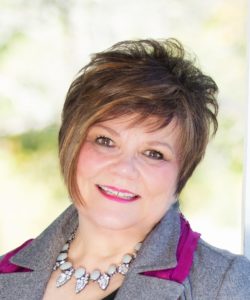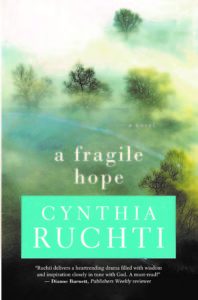 We easily become so absorbed in our own responsibilities, problems and concerns that we miss what is going on in the lives of those around us, even those we love the most. That’s where Josiah Chamberlain finds himself in award-winning author Cynthia Ruchti’s latest release, A Fragile Hope (Abingdon Press). When his life starts falling apart around him, will the fragile hope he has left be enough to help through the most difficult time of his life?
We easily become so absorbed in our own responsibilities, problems and concerns that we miss what is going on in the lives of those around us, even those we love the most. That’s where Josiah Chamberlain finds himself in award-winning author Cynthia Ruchti’s latest release, A Fragile Hope (Abingdon Press). When his life starts falling apart around him, will the fragile hope he has left be enough to help through the most difficult time of his life?
Q: In a few sentences, tell us about your new book, A Fragile Hope.
Much-in-demand marriage and family expert Josiah Chamberlain finishes the final chapter of his latest book — destined to be another best-seller, he’s sure — to discover his wife has left him. Everything he assumed about their relationship disintegrates. His wife, Karin, can’t tell him why she left. It will cost him everything to keep loving with nothing but a fragile hope his career, his sanity, his faith and their marriage can survive.
Q: Your leading man, Josiah, is a well-known marriage expert yet he failed to notice how his marriage was crumbling around him. How did he miss the warning signs?
Even in the best marriages, couples often misread the signals their partner is giving. It can range from things as simple as “Can we turn up the furnace?” to as complicated as “I’m more miserable than I can explain.” When the husband or wife — or both — become consumed with their own needs or the demands of their jobs or never-ending concerns for their children, they can miss the subtle hints their neglected marriage needs attention. Josiah isn’t alone in failing to practice what he preaches. We’ve probably all been guilty of that, especially when stressed or overwhelmed. In Josiah’s case, an air of arrogance and self-absorption — both born from his past hurts — contribute to his missing the warning signs.
It’s natural to become absorbed with our own problems and concerns, our own responsibilities and even our diligence to respond to the needs of the people around us and miss what’s going on in our homes, with the people we love the most, who mean the most to us. What do we miss in our spouse’s facial expression when we’re glued to our phone screens or computer screens? What sighs are we neglecting? What busyness could be more important than staying connected with our family and with God? Yet it happens all too often. What if all we changed about our relationships is that we paid attention? What might happen? Neglect can kill a marriage as dramatically as betrayal. Josiah might have made that a speaking topic. He wasn’t prepared to see it lived out in his own home.
Q: Given his career, one may argue Josiah should have been equipped to face a crisis. What strengths helped him through the most difficult time of his life, and in what ways could he have been better prepared?
When the crisis is in its infancy, Josiah’s education and experience almost get in the way. He trips over his own advice. Eventually he learns how to wade through his quick-tip counsel and toss everything that doesn’t align with counsel of a much higher level than his own thoughts. His faithfulness to his wife and to his underdeveloped faith — even when it doesn’t make sense to remain faithful — serves him well. What a lesson for all of us! When Josiah begins to lose his tentative grip on hope — hope that Karin will ever come back to him, hope that what they’re facing won’t be as bad as it looks, hope that God will intervene somehow — he falters.
Josiah and his audiences and reading public all considered him an expert at relationships, but so much of it was theory that fell apart in the harsh light of betrayal.
It’s often when we feel the most sure of ourselves that life will smack us in the face with a reminder of our relative weakness. God invited us to lean on Him, assuring us that when we feel the weakest, His strength will rise to cover us. When hope looks paper-thin, God assures us it is not. It’s an anchor for our soul.
 Q: Can you share the progression and growth Josiah made throughout the story? How important were the mentors who came along during the journey?
Q: Can you share the progression and growth Josiah made throughout the story? How important were the mentors who came along during the journey?
Without giving away too much of the story, one of the primary ways Josiah grew was in his understanding of love’s truest definition. He thought he knew. Don’t we all? As the story progresses, so does his understanding of what love really means, what it really looks like, how it responds in crisis. He had the advantage of a couple of mentor-like characters who helped clear away the fog in his thinking, who helped anchor him and served as listening ears when he was finally ready to talk. The emotionally healthy among us can point to people whom we consider our mentors, friends or family who play the listening ear role. Josiah rejected the help of some who reached out to him. Eventually the people who did serve that vital role in his life — redirecting his self-absorbed thoughts, reconnecting him with the God of hope, standing by him no matter the circumstances — were people who had come through their own distresses with integrity. They lived lives of grace, which made them great candidates for offering trustworthy advice.
As important as mentors are, we can’t advertise, “I need a mentor!” Usually a mentor/mentee relationship will develop organically. We observe those around us who navigate personal crises with rock-solid faith and unflappable hope. They don’t unravel. Love is a hallmark of all they do. That’s a mentor worth following.
Q: What lessons in love are revealed to readers in A Fragile Hope?
Even though the lessons within the novel A Fragile Hope are tucked quietly between the covers, I hope readers find them unmistakable.
- The strength and fragility of love. Both are true. A couple I know has made writing and speaking on the subject of love their life’s work. Not long ago, the husband was in an accident that could have snuffed out his life. Their love is strong and practiced, but it could have ended that night. On hearing of the accident, before she knew the extent of his injuries, the wife whispered a gratitude prayer that it had become habit for them to say “I love you” every time they said goodbye, whether for an hour or a week. Love would have been their last words to each other if he hadn’t survived the accident. No wonder their relationship is so strong. Everything they do is bookended with love.
- The need for constant nurturing in relationships. It’s easy to fall into routine in marriage, to assume if it has survived the first few years, the rest is coasting. However, the opposite is true. Coasting in marriage is as dangerous as coasting in our faith. If we’re not moving forward, we’re moving backward.
- The power and gift of communication. Not all communication in marriage is verbal, but not all talking is communicating either. Communication is the act of exchanging gifts of listening and responding. Just as prayer is an interconnection WITH God, not words spoken TO God, so communication in marriage is an interchange with the goal of understanding, not winning.
- Against our natural inclination and instincts, at its heart, love is sacrifice. Jesus demonstrated this truth poignantly, showing His love by sacrificing His life for us. The best marriages are those where personal agendas bow to the need of the other, but in such a grace-filled way the one bowing feels blessed. Not at all what we see disguised as love in most movies or television dramas.
Q: Is it possible to get past the devastation of betrayal completely? What words of encouragement can you offer readers who may be struggling with past hurts?
God tells us He “remembers our sins no more” in Isaiah 43:25 and Hebrews 12:8. He is the only One who can forgive AND forget perfectly. The rest of us are invited to tap into His strength to forgive those who wrong us or betray us. However our human minds find it more challenging to forget. Choosing to love in spite of our hurt slowly rebuilds what shattered when trust was broken. Personally I also believe that leaning into God — the perfect Forgiver, the Author of forgiveness — is the only way we can move beyond disappointment or betrayal to see love restored again.
Q: How long ago did you first start work on A Fragile Hope? Is there a reason why this story was such a long work in progress?
This story lived in a tender spot under my heart for more than eight years. Seven other novels and novellas were written before I was given the opportunity to revisit A Fragile Hope. My thoughts would return to the story often, but the pieces were scattered. Some were missing. Then, as I began to work on it again after years away from it, I discovered the lost pieces sliding into place to rework the story as it stands today. I might never know why it was important for the story to wait until now. Maybe something needed to grow within me. Maybe the reader who most needs the book wouldn’t have reached for it until now.
Q: What scripture passage played a part in the inspiration of this book?
This won’t seem like the typical scripture to inspire a contemporary novel, but readers will find deep in the story why this snippet of a familiar verse played such a key role. In many churches, as communion is served, we hear I Corinthians 11:23-24, “The Lord Jesus on the night in which He was betrayed took bread; and when He had given thanks, He broke it and said, ‘This is (represents) My body, which is [offered as a sacrifice] for you,’” (Amplified Bible).
I was deeply moved by the idea that Jesus showed us the depth of His love most significantly “on the night He was betrayed.” What would that look like in a husband/wife relationship — or any other relationship, for that matter? Can love shine brightest on the night it’s betrayed? That’s what love does: gives of itself when it makes the least sense.
Q: Normally something that happened in your own life also ignites a spark in the writing process. What personal experience did you draw from for A Fragile Hope?
I visited my mom at her small apartment often. We knew that before long, her congestive heart failure and other life-threatening issues would send her to a hospice residence facility. One afternoon shortly before that became necessary, her pastor came to the apartment to serve her communion. As he read that passage from I Corinthians, he got no farther than the word “betrayed” before I was in tears. The weight and depth and magnitude of the kind of love Jesus shows us bore down on me like a weighted blanket, smothering me with wonder in that tender, holy moment. It changes everything when we fully appreciate — or try to appreciate— the reality that love is at its most glorious when it sacrifices.
Q: All of your books address hope in some way. How did hope become the center of your writing?
In my early days as a novelist, which has really been less than 10 years ago, I used the tagline “Hope that glows in the dark.” Hope sometimes shows up best against a dark backdrop. However a few years ago, as I considered what it was about hope that made it appealing, needed and accessible, I adopted a new tagline: “I can’t unravel. I’m hemmed in Hope.” I tell stories hemmed in hope, whether through novels, novellas, devotions, nonfiction or speaking events. Hope is in short supply these days for many people, but God has an abundant supply of it for us. When we embrace that truth, we can truly be hemmed in hope.
Q: What is the message you hope readers take away from reading A Fragile Hope?
“Disappointment and betrayal are always more layered than we imagine. Hope is always stronger than it appears, even at its most fragile.”
In addition to hoping readers will finish the book with a satisfied sigh, I pray they’ll also have gained a deeper appreciation for the power of love and the strength of hope. Fragile? It only seems that way.
To keep up with Cynthia Ruchti, visit www.cynthiaruchti.com. You can also follow her on Facebook (Cynthia Ruchti), Twitter (@cynthiaruchti) and Pinterest (cynthiaruchti).

